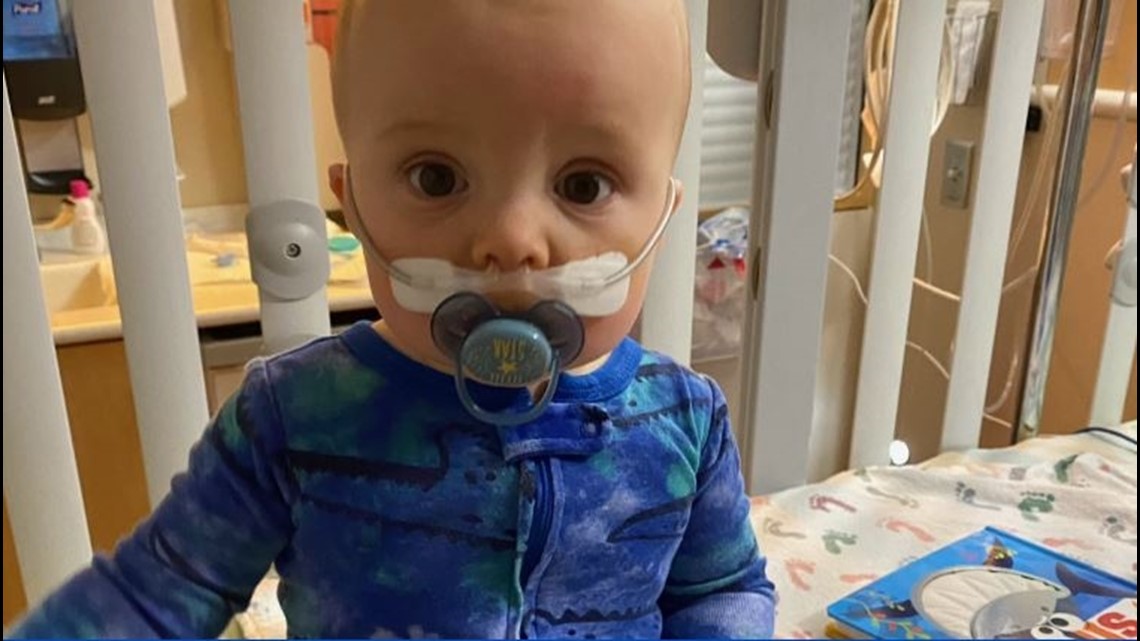DENVER — Coloradans may never know the full extent of RSV cases because the state is not required to report some data. RSV-related pediatric deaths are not a required nationally notifiable disease but flu-related pediatric deaths are.
This week the state epidemiologist said the positivity rate for RSV is approaching 25% with no sign of it slowing down. Dr. Kevin Carney, the associate medical director of Children's Hospital Colorado said he believes the state has probably peaked in terms of RSV numbers.
"Is there a reason for not reporting it," Conner O'Brien, father to a 1-year-old asked. O'Brien said his son Fynn was recently hospitalized with RSV for 12 days.


He believes reporting the number of deaths could make a difference with how seriously parents approach the illness.
"I feel like a lot of people don't understand the severity of it unless they've either experienced it firsthand or if somebody else close to them has gotten it," he said.
9NEWS reached out to CDPHE with some questions regarding the lack of reporting of RSV-related pediatric deaths. Brian Spencer, a CDPHE spokesperson responded with a few answers.
Why are RSV-related pediatric deaths not reportable in Colorado?
Spencer: RSV is not a required nationally notifiable disease, and states may approach disease reporting requirements differently. The list of reportable conditions in Colorado is reviewed at Board of Health meetings to determine whether and when new conditions should be added.
In Colorado, RSV-associated hospitalizations are reportable in the five-county Denver metro area (Adams, Arapahoe, Denver, Douglas, and Jefferson counties) as a part of CDC’s Emerging Infections Program. Colorado is one of ten sites in the Emerging Infections Program with Centers for Disease Control and Prevention (CDC). The program collects information on certain infections to learn more about disease patterns and risk factors. We use data from this program to make health recommendations and better understand infectious diseases in Colorado and the rest of the country.
Are flu-related pediatric deaths reportable?
Spencer: Yes.
If so, why are they reportable and NOT RSV-related pediatric deaths? What is the difference?
Spencer: Pediatric influenza deaths are a nationally notifiable disease but RSV pediatric deaths are not.
Pediatric influenza deaths were made nationally notifiable in 2004 in response to recently expanded recommendations for influenza vaccination of children. The goal was to identify opportunities for prevention. While we are not aware of any plans for RSV pediatric deaths to be made nationally notifiable when an RSV vaccine is licensed, that is a possibility.
Public health officials are responding to both viruses, but the response tactics differ because while flu is vaccine-preventable, RSV does not have a vaccine.
With the flu, a strategy is to follow the data, encourage practices to decrease transmission, and deploy vaccines in higher risk areas, as well as throughout the state.
With RSV, a strategy is to inform the public about preventive tactics such as staying home when sick or washing hands regularly.
Because both viruses are circulating right now, we are in constant communication with hospitals to help with coordination to protect hospital capacity.
Is there a concern that by not reporting the deaths, Coloradans may not take the virus seriously?
Spencer: We are working to slow transmission of RSV, and we are grateful that Coloradans are taking this virus seriously.
We have taken multiple actions to inform the public and slow the spread, including:
- We sent two press releases in recent weeks and held a news conference last week to communicate important information to Coloradans about the seriousness of these respiratory illnesses and the current strain they are placing on some hospitals. Our communications to external partners includes sharing guidance for prevention & control of non-COVID-19 respiratory illnesses in schools and childcare settings including recent recommendations for enhanced infection control in child care facilities.
- Governor Polis signed an executive order amending and extending the current COVID-19 disaster declaration to include RSV, influenza, and other respiratory illnesses in support of this response. The Colorado Department of Regulatory Agencies and Colorado Division of Insurance issued emergency regulations to help hospitals address capacity issues arising from increased hospitalizations due to respiratory illnesses.
- Public health’s response to all respiratory viruses right now is interconnected. We are leveraging all of our limited resources to protect hospital capacity and make decisions based on the data we have available, which will always have its limitations, but is powerful in determining our strategies.
SUGGESTED VIDEOS: Mental Health & Wellness

